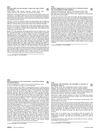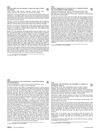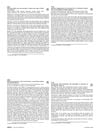 34 citations,
June 2010 in “Archives of Disease in Childhood”
34 citations,
June 2010 in “Archives of Disease in Childhood” Menstrual disorders are common in adolescents and can be influenced by weight, activity, and health issues, requiring careful evaluation and more research for effective treatment.
 July 2017 in “Contemporary Endocrinology”
July 2017 in “Contemporary Endocrinology” The document concludes that patient outcomes for Congenital Adrenal Hyperplasia are often not ideal because of poor management and a need for better diagnosis and treatment methods.
 10 citations,
December 2015 in “Clinics in Dermatology”
10 citations,
December 2015 in “Clinics in Dermatology” Diabetes can lead to blindness and skin problems, and managing blood sugar and blood pressure is crucial to prevent these complications.
 April 2023 in “Clinical Chemistry and Laboratory Medicine”
April 2023 in “Clinical Chemistry and Laboratory Medicine” The document concludes that inflammation markers can be used in diabetes, vitamin D3 affects immune pathways, hyperthyroidism changes hormone levels, androgen levels help diagnose Adrenocortical Carcinoma, erectile dysfunction is linked to diabetes, hypogonadism is common in HIV-infected males, and hormones can be biomarkers for various conditions.
1 citations,
January 2022 in “Dermatology Research and Practice” Androgenetic alopecia negatively affects self-esteem and daily stress, especially in young men.
 18 citations,
March 2014 in “Current Pharmaceutical Biotechnology”
18 citations,
March 2014 in “Current Pharmaceutical Biotechnology” Metformin helps regulate menstrual cycles, induce ovulation, and improve pregnancy outcomes in women with PCOS.
 August 2018 in “Journal of The American Academy of Dermatology”
August 2018 in “Journal of The American Academy of Dermatology” Regular follow-up visits, especially with dermatologists, can lower death rates for melanoma patients, with socioeconomic factors also affecting outcomes.
 1 citations,
August 2018 in “Journal of The American Academy of Dermatology”
1 citations,
August 2018 in “Journal of The American Academy of Dermatology” Dutasteride and minoxidil mesotherapy effectively treats hair loss with minimal side effects.
 August 2018 in “Journal of The American Academy of Dermatology”
August 2018 in “Journal of The American Academy of Dermatology” Melanoma survival rates vary by state and are better where incomes are higher, more people have health insurance and education, and there are more dermatologists.
 4 citations,
October 2021 in “Journal of family medicine and primary care”
4 citations,
October 2021 in “Journal of family medicine and primary care” In the Jazan region of Saudi Arabia, hair loss is common, especially among women, older people, and those with higher education and BMI. Stress, poor nutrition, and hormonal changes are key causes, but many don't seek medical help.
 1 citations,
August 2018 in “Journal of The American Academy of Dermatology”
1 citations,
August 2018 in “Journal of The American Academy of Dermatology” Patients with melanoma who saw dermatologists and were from higher-income areas were more likely to have follow-up visits, which was linked to lower mortality.
 42 citations,
August 2021 in “Narra J”
42 citations,
August 2021 in “Narra J” Many COVID-19 survivors experience long-lasting symptoms, including hair loss and psychological issues.
 32 citations,
January 2017 in “Patient Preference and Adherence”
32 citations,
January 2017 in “Patient Preference and Adherence” Alopecia affects patients' quality of life, with younger patients and longer-lasting hair loss experiencing greater impact.
 20 citations,
September 2013 in “Anti-Cancer Drugs”
20 citations,
September 2013 in “Anti-Cancer Drugs” PTH-CBD could help prevent and treat hair loss caused by chemotherapy in mice.
 15 citations,
January 2018 in “Annals of Dermatology”
15 citations,
January 2018 in “Annals of Dermatology” Wigs significantly improve the well-being of people with severe hair loss.
 November 2024 in “Journal of Cosmetic Dermatology”
November 2024 in “Journal of Cosmetic Dermatology” PRP improves hair transplant results in androgenetic alopecia patients.
9 citations,
May 2019 in “Medicine” The C-allele and CC-genotype in the PTPN22 gene lower the risk of alopecia areata.
 April 2024 in “Journal of asthma and allergy”
April 2024 in “Journal of asthma and allergy” Abrocitinib effectively treated severe atopic dermatitis and mild alopecia areata in a 12-year-old boy after dupilumab failed.
 December 2022 in “Cureus”
December 2022 in “Cureus” Adult women with acne in Iraq often have more severe symptoms and hormone-related issues than younger girls with acne.
 26 citations,
June 2016 in “Pediatric Dermatology”
26 citations,
June 2016 in “Pediatric Dermatology” Premature hair graying in young Turkish adults is more likely if they have stress, a family history of graying, drink alcohol, have chronic diseases, are older, or are taller.
 6 citations,
November 2007 in “Archives of Disease in Childhood: Education & Practice”
6 citations,
November 2007 in “Archives of Disease in Childhood: Education & Practice” The document concludes that accurate diagnosis of alopecia in children relies on thorough examination and history, and while treatments exist, none can alter the course of alopecia areata, which can significantly affect a child's psychological well-being.
 1 citations,
June 2021 in “Journal of gynecology and womens health”
1 citations,
June 2021 in “Journal of gynecology and womens health” The study found that PCOS affects about 6.5-6.8% of women in both urban and rural areas of Telangana, India, and highlighted the importance of lifestyle changes for management.
 51 citations,
January 2014 in “Pediatric Clinics of North America”
51 citations,
January 2014 in “Pediatric Clinics of North America” The guide explains how to identify and treat children's hair loss, including fungal infections, autoimmune disorders, hairstyle changes, self-correcting conditions, and behavioral therapy for hair-pulling.
 225 citations,
July 2007 in “The Journal of Sexual Medicine”
225 citations,
July 2007 in “The Journal of Sexual Medicine” Knowing about finasteride's sexual side effects increases reported dysfunction.
 40 citations,
July 2008 in “Drug Discovery Today”
40 citations,
July 2008 in “Drug Discovery Today” Current treatments for male pattern baldness include minoxidil and finasteride, with new options being developed.
 April 2024 in “Frontiers in pharmacology”
April 2024 in “Frontiers in pharmacology” Brepocitinib 30mg is most effective for moderate-to-severe alopecia areata, but ritlecitinib 50mg may offer a better balance of safety and effectiveness.
 October 2023 in “Dermatology practical & conceptual”
October 2023 in “Dermatology practical & conceptual” Pulse corticosteroids help regrow hair in alopecia areata but have side effects, especially betamethasone.
 1 citations,
September 2023 in “Dermatology and Therapy”
1 citations,
September 2023 in “Dermatology and Therapy” Baricitinib helps improve hair growth in severe alopecia, with better results in less severe cases and higher doses working faster.
 2 citations,
January 2017 in “Journal of Pigmentary Disorders”
2 citations,
January 2017 in “Journal of Pigmentary Disorders” Vitiligo causes white skin patches and can lead to psychological stress.
 October 2023 in “Frontiers in endocrinology”
October 2023 in “Frontiers in endocrinology” Effective PCOS treatments require targeting specific signaling pathways.




























